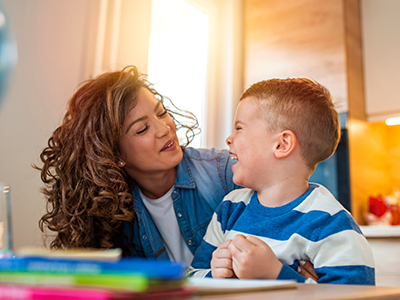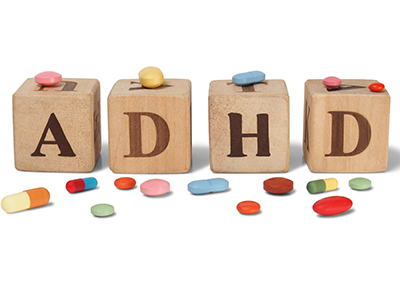Picture this: Your child is struggling to focus on their homework. They seem to be unable to sit still, as if they were running on a motor. When you finally get them to sit down, they stare blankly into space, unsure of where to even start. Running behind schedule, after a long day at work, you are desperately trying to get dinner ready for the family. Emotions are running high, and you are trying your best to ‘keep your cool.’ This has become the new routine. At times, it can feel IMPOSSIBLE. Sound familiar?
You are not alone.
Your child may be experiencing symptoms of attention deficit hyperactivity disorder, or ADHD. And parenting a child with ADHD can come with its own set of unique challenges – challenges that can intensify when you, too, are struggling with similar difficulties. We now know that ADHD runs in the family. In fact, research shows that ADHD is highly heritable, meaning it is very common for parents of children with ADHD to also struggle with ADHD themselves.
Effective parenting requires our brain’s so-called ‘executive functions’: exercising good judgment, thinking ahead, being patient and managing our emotions. While these are no easy feats for anyone, these are the exact functions that ADHD symptoms challenge on a day-to-day basis. If you are a parent with ADHD, some situations you may struggle with while parenting a child who also has ADHD are:
- Time management: As a parent, you are tasked with the need to ‘wear many hats.’ You are juggling endless responsibilities across home, work, your child’s school and your social lives (to name a few). In order to keep up, setting priorities and meeting deadlines are important. ADHD can make these tasks feel unachievable.
- Organization: Feel like no matter how much you try to organize, your child’s stuff is still all over the place? Or despite numerous planners, your to-do list is never complete, and appointments are missed? As a parent, you are often responsible for not only your own ‘stuff’, but for the whole family’s. Your own ADHD symptoms may make organization difficult, and tasks like tracking your child’s extracurricular activities and school assignments can be that much more challenging.
- Emotion regulation and stress: Did you know that adults with ADHD may also struggle with managing their emotions? As a parent, this can be particularly challenging when tensions are high, as it may be difficult for you to manage your and your child’s emotions simultaneously. So, when you feel like you are more irritable than usual or need to ‘space out’ after emotionally-draining days, this may be explained by your own ADHD. This is especially true when you are feeling stressed and can contribute to even more stress. Understanding how ADHD impacts our emotions is important because it can provide greater clarity into our own and your child’s emotions, which can help de-escalate emotionally-tense interactions.
An important note – despite this link between parent and child ADHD, it is important to remember that you, as a parent, did not cause your child’s ADHD, nor are your child’s difficulties your fault. What this link does tell us is that empowering caregivers to 1) understand your own symptoms and 2) prioritize your own well-being is key to decreasing parenting challenges while strengthening your bond with your child.
The other side of the ‘ADHD coin’
It’s important to highlight that, along with the challenges that often come with ADHD, some parents may find that their ADHD has benefited their life, including increasing their understanding of their child and strengthening the parent-child bond. For example:
- Creativity: Adults and children with ADHD may enjoy thinking outside the box, leading to originality and uniqueness. As an ADHD parent-child pair, you may find creative activities to do together to exercise this ‘creativity’ muscle. Arts & crafts are an excellent way to allow yourself and your child to express themselves, while spending quality time with your little one.
- Enthusiasm and fun: Adults and children with ADHD, alike, experience periods of high energy and often have a sense of fun. This may mean that you and your child may bond over exciting and adventurous hobbies, such as sports or other active pastimes.
- Social connectedness: Many individuals with ADHD have a strong sense of intuition and demonstrate a high level of sensitivity to the needs and emotions of others. This heightened empathy can be a strength in the formation and maintenance of interpersonal relationships with friends and family. In this way, your ADHD as a parent may increase your sensitivity to your child’s difficulties and emotions – an important part of a healthy parent-child relationship!
Tips for caring for yourself as a caregiver
If you find yourself struggling with your own ADHD symptoms, here are a few tips to try:
- Use time management tools
- Keep a single calendar
- Write down your to-dos and prioritize tasks
- Use alarms and reminders to stay on-time
- Regulate your emotions through mind-body relaxation
- Mindfulness
- Progressive Muscle Relaxation
- Yoga and Stretching
- Prioritize yourself
- Find time to do things you enjoy and that matter to you
- Stay connected with supportive people in your life
- Keep up good physical health, through healthy eating and sleeping
Bottom line
Your well-being as a caregiver matters – a lot! Not just for yourself (which is important in its own right), but also for your relationship with your child. Indeed, research shows us that parents who have prioritized self-care have shown better adjustment in their children. While it may feel impossible to find times to prioritize yourself, given competing demands and busy schedules, we often find that those are the times where you need self-care the most! So even fitting in one thing a day for yourself, no matter how small, can make a world of difference. And an important thing to remember – you are not alone.
In the D.C./Maryland/Virginia (DMV) area? If so, consider enrolling in our Treating Parents & Children (TPAC) Program! If you and your child have ADHD, visit www.tpacprogram.com or email us at tpac@childrensnational.org to learn more about Dr. Chronis-Tuscano’s NIMH-funded program for families with ADHD.
 https://riseandshine.childrensnational.org/wp-content/uploads/2025/06/soccer-team-feature.jpg
300
400
webteam
https://riseandshine.childrensnational.org/wp-content/uploads/2017/11/childrens_riseandshine_logo.jpg
webteam2025-06-05 16:30:042025-06-06 09:45:10Supporting your young athlete’s attention and executive functions in sports
https://riseandshine.childrensnational.org/wp-content/uploads/2025/06/soccer-team-feature.jpg
300
400
webteam
https://riseandshine.childrensnational.org/wp-content/uploads/2017/11/childrens_riseandshine_logo.jpg
webteam2025-06-05 16:30:042025-06-06 09:45:10Supporting your young athlete’s attention and executive functions in sports







Leave a Comment
Want to join the discussion?Feel free to contribute!